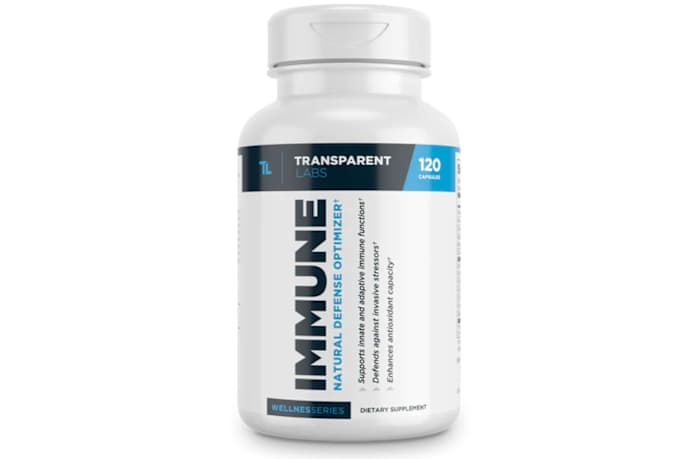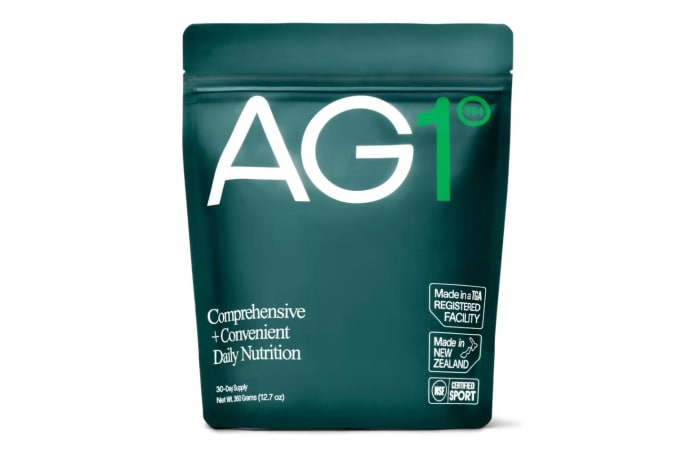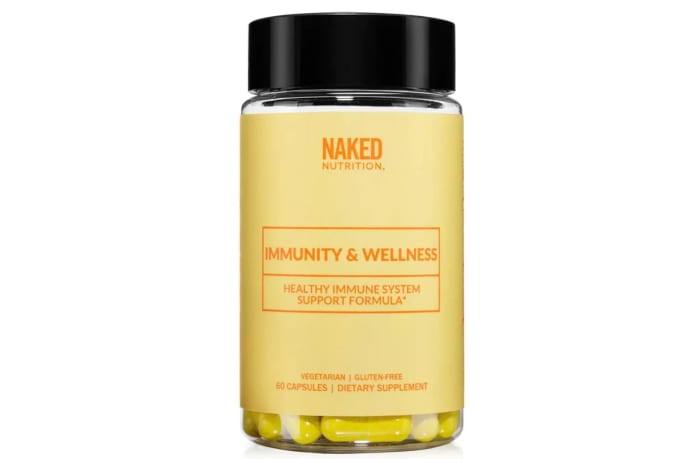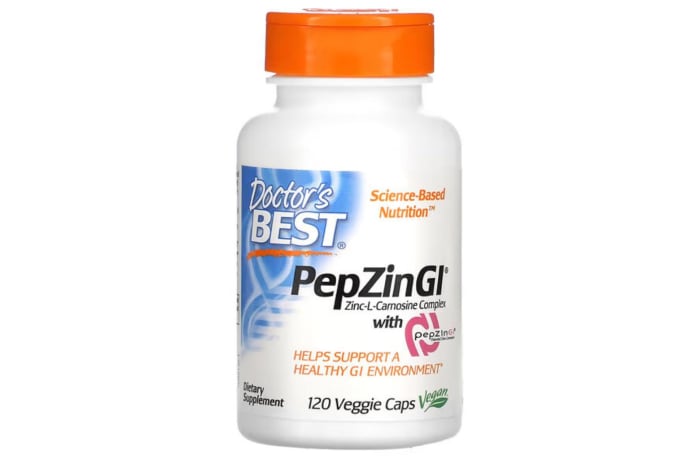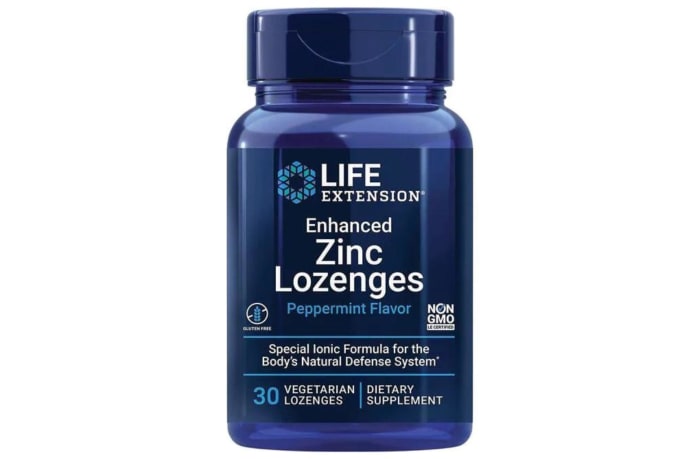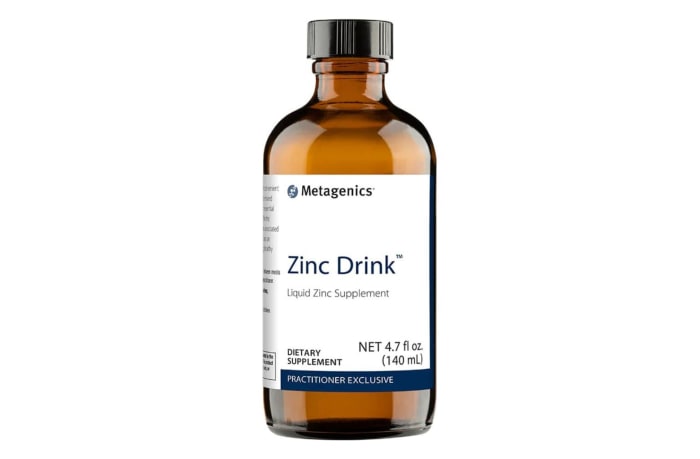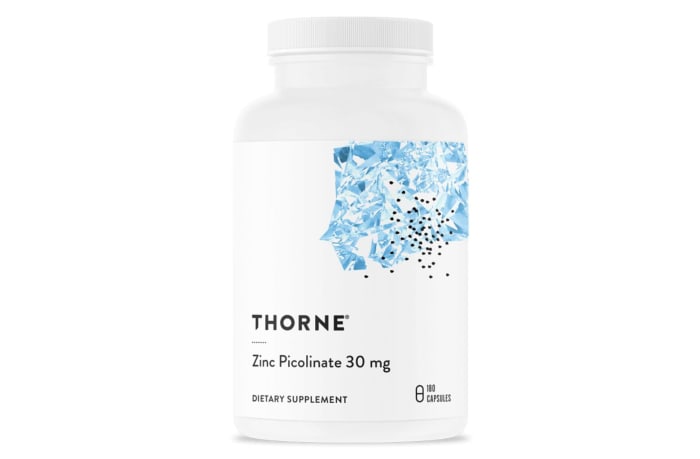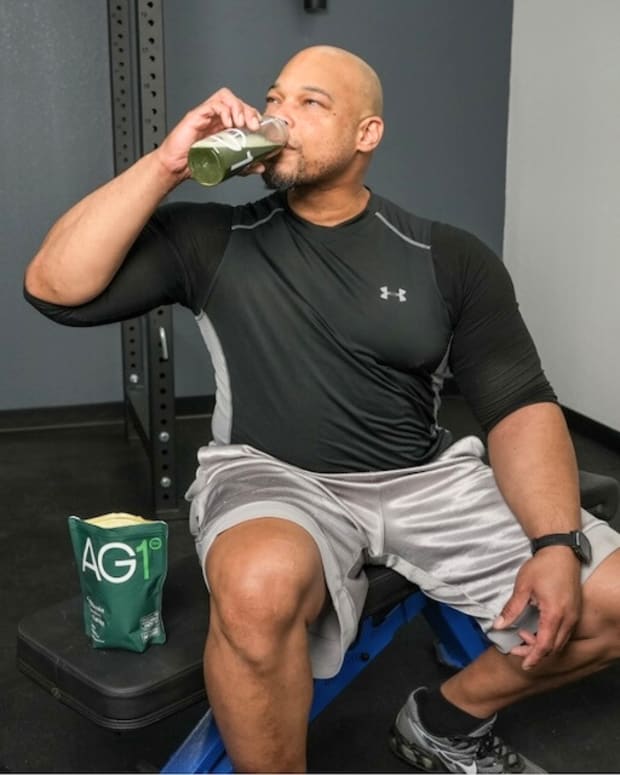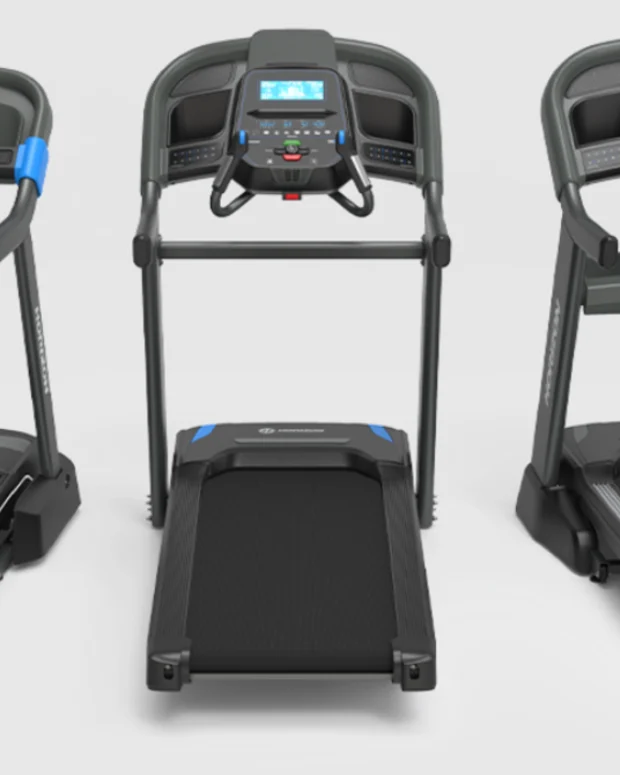The products featured in this article have been independently reviewed. When you buy something through the retail links on this page, we may earn commission at no cost to you, the reader. Sports Illustrated editorial staff are not involved in the creation of this content. Learn more here.
Zinc is an essential nutrient that your body cannot make on its own. It’s vital for much more than boosting your immune function during cold season. Zinc is also vital for healthy skin, digestion, vision and anti-inflammatory functions. But if your diet is low in zinc—as it is for many vegetarians and vegans—you may lack this important element. Zinc supplementation can also be helpful for those with certain health conditions, like heart disease, diabetes, liver problems and age-related muscle deterioration.
There are seemingly endless zinc supplements on the market, which is why we consulted a clinical nutritionist to find the best zinc supplements available in 2024, plus a primer on what kinds of zinc are available, the best time to take a zinc supplement and the best dose for your age and health.
Our Picks for the Best Zinc Supplements of 2024:
- Best Zinc Supplement for Men: Transparent Labs Immune
- Best Zinc Supplement and Multivitamin: Athletic Greens AG1
- Best Zinc Supplement for Immune System: Naked Nutrition Immune Support Supplement
- Best Zinc Supplement for GI Health: Doctor’s Best Zinc-L-Carnosine
- Best Magnesium and Zinc Supplement: Solaray Calcium Magnesium Zinc
- Best Vitamin C and Zinc Supplement: Garden of Life Vitamin Code Raw Zinc
- Best Zinc Supplement for Colds: Life Extension Enhanced Zinc Lozenges
- Best Vegan Zinc Supplement: MegaFood Zinc
- Best High-Dose Zinc Supplement: Nature Made Zinc
- Best Liquid Zinc Supplement: Metagenics Zinc Liquid Drink
- Best Zinc Supplement for Absorption: Thorne Zinc Picolinate
Best Zinc Supplement for Men: Transparent Labs Immune
Key features and specs
- Serving size: Four capsules
- Servings per container: 30
- Zinc per serving: 15 milligrams
- Form: Zinc-L-methionine
- Other ingredients: EpiCor Dried Yeast Fermentate, Organic Reishi Mushroom, Quercetin Dihyrdate, CurcuWIN Ultra+ Tumeric extract, Gingever ginger extract, BioPerine (black pepper fruit extract), Magnesium, Vitamin C, Vitamin D, Vitamin B12
- Certifications: NSF certified for sport and manufactured in a Good Manufacturing Processes (GMP) facility
- Price: $39.99 ($1.33/serving) for one-time purchases, $35.99 ($1.20/serving) for subscribers
Our zinc recommendation for men is Transparent Labs Immune. This product contains promising immune boosters like dried fermented yeast, Tumeric extract and ginger extract, as well as evidence-based immune boosters, including organic reishi mushroom and, of course, zinc. The black pepper fruit extract (also called piperine or BioPerine) may increase absorption of the zinc.
Transparent Labs is a brand that's committed to clean ingredients and transparent labels. On their website, you can reference the studies they use to support the inclusion of each active ingredient, which is rare in the supplement industry. They also exclude additives like artificial sweeteners, color and preservatives.
Related Post: The Best Supplements for Men to Take
Pros
- Contains patented L-OptiZinc (zinc-L-methionine), which Transparent Labs claims is one of the most bioavailable forms of zinc
- BioPerine increases absorption of vitamins and minerals, including zinc
- No artificial sweeteners, colors or preservatives
- NSF certified for sport
Cons
- Expensive
- One serving is four capsules, which is a lot
Best Zinc Supplement and Multivitamin: Athletic Greens AG1
Key features and specs
- Serving size: One scoop (12 grams)
- Servings per container: 30
- Zinc per serving: 15 milligrams
- Form: Zinc citrate
- Other ingredients: 20 additional vitamins and minerals, digestive enzymes, super mushroom complex, dairy-free probiotics, natural flavors, nutrient-dense raw superfood complex
- Certifications: NSF certified for sport, manufactured in TGA and Good Manufacturing Practice (GMP) registered facilities
- Price: $99 ($3.30/serving) for one-time purchases, $79 ($2.63/serving) for subscribers
There’s a good chance you’ve heard about Athletic Greens AG1 from health and wellness influencers, and we stand behind the hype. Not only does AG1 supply 15 milligrams of zinc citrate, which is easy on the digestive tract, but it also contains 20 other vitamins and minerals, a superfood complex, dairy-free probiotics, antioxidants and an enzyme and mushroom complex. These additional ingredients help fill in your metabolic and nutritional gaps.
Related Post: The Best Greens Powders to Bump Up Your Nutrient Intake
In addition to being an excellent probiotic and multivitamin with zinc, AG1 is safe for use by athletes thanks to its NSF certification. The certifications process at Athletic Greens involves testing and verifying each ingredient and finished batch. AG1 is also vegetarian, vegan, paleo and keto-friendly, and free of gluten, dairy, corn, egg and peanuts. Note that it does contain soy.
Pros
- Zinc citrate is easy to digest
- Suitable for vegetarians, vegans, and those following paleo and keto diets
- Contains three adaptogenic herbs that may help reduce stress, anxiety and fatigue (rhodiola, ashwagandha and eleuthero)
- No artificial colors, flavors, preservatives or sweeteners
- Contains two important probiotics: L. acidophilus and B. bifidum
Cons
- Expensive
- Not suitable for those sensitive to soy
Best Zinc Supplement for Immune System: Naked Nutrition Immune Support Supplement
Key features and specs
- Serving size: Three capsules
- Servings per container: 20
- Zinc per serving: 30 milligrams
- Form: Zinc bisglycinate chelate
- Other ingredients: Vitamin A, Vitamin C, Vitamin D3, selenium, Yestimun (brewer’s yeast beta glucan), ParActin (andrographis paniculata), ivy leaf extract powder, organic Reishi mushroom extract, hypromellose, organic rice concentrate, organic rice extract blend, titanium dioxide, riboflavin
- Certifications: None listed
- Price: $24.99 ($1.25/serving) for one-time purchases, $19.99 ($1/serving) for subscribers
Naked Nutrition Immune Support Supplement is packed full of immune boosting ingredients, which is why it’s our top zinc supplement for the immune system. In addition to a double dose of zinc and Vitamins A, C and D3, Naked Nutrition Immune Support contains:
- Selenium (supports a healthy immune response)
- Beta glucan (may help treat autoimmune diseases)
- Andrographis paniculata (treats respiratory tract infections)
- Ivy leaf extract (used to treat bronchitis and asthma)
- Organic Reishi mushroom extract (may improve immune function; has been shown to suppress the development of cancerous polyps in the colon)
- Riboflavin (has antimicrobial properties)
Naked Nutrition Immune Support may be taken with other supplements and daily vitamins as long as your Vitamin C intake stays below the upper limit (2,000 milligrams). Always consult with your physician if you’re taking blood thinners, antacids and nitrate medications that may interact with the ingredients in this supplement. Naked Nutrition recommends taking three capsules of Immune Support daily when you feel under the weather and one capsule when you feel fine. They also recommend taking a one month break after three months of daily use.
Pros
- Contains active ingredients backed by research
- Contains almost three times the daily recommended amount of zinc (11 milligrams for men and eight milligrams for women) without surpassing the upper limit of 40 milligrams for adults
- Non-GMO, gluten- and soy-free, and free of artificial flavor, colors and sweeteners
- Suitable for vegetarians
Cons
- Ingredients may interact with present medications or other daily vitamins
- Formula lacks Vitamin E, which is a vitamin antioxidant that supports the levels of Vitamin A and Vitamin C together for immunity
Buy Naked Nutrition Immune Support Supplement
Best Zinc Supplement for GI Health: Doctor’s Best Zinc-L-Carnosine
Key features and specs
- Serving size: Two capsules
- Servings per container: 60
- Zinc per serving: 16 milligrams
- Form: Zinc-L-carnosine
- Other ingredients: Microcrystalline cellulose, modified cellulose (vegetarian capsule), magnesium stearate (vegetable source), silicon dioxide
- Certifications: Third party tested and made in GMP-certified facilities
- Price: $18.99 ($0.32/serving)
Doctor’s Best has been in the supplement business for over 30 years. Their products are clinically researched, third party tested and manufactured in GMP-certified facilities. Doctor’s Best Zinc-L-Carnosine is the best zinc supplement for GI health because of the type of zinc used in the formulation: zinc-L-carnosine. This form has been shown in studies to deliver zinc directly to the tissues of the GI tract, which can facilitate faster gut healing. For example, zinc-L-carnosine can help heal ulcers and damage to tissues caused by H. pylori.
Pros
- Improves immunity
- Restores the lining of the gut and improves GI disorders
- Non-GMO, vegan, gluten- and soy-free
Cons
- Includes additive silicon dioxide
Buy Doctor’s Best Zinc-L-Carnosine
Best Magnesium and Zinc Supplement: Solaray Calcium Magnesium Zinc
Key features and specs
- Serving size: Four capsules
- Servings per container: 25
- Zinc per serving: 25 milligrams
- Form: Amino Acid Chelate
- Other ingredients: Vegetable Cellulose Capsule, Magnesium Stearate, Croscarmellose Sodium, Whole Rice Concentrate (bran, polishing germ), Alfalfa Leaf, Watercress, Dandelion Root, Parsley Leaf
- Certifications: Made in a cGMP facility, Safe Quality Food Institute (SQF) certified, certified Organic
- Price: $11.39 ($0.46/serving)
Magnesium, zinc and calcium deficiencies are fairly common, yet these minerals are vital for overall health. Magnesium is important for energy and muscle and nerve function; calcium is vital for healthy bones and teeth and normal muscle, heart and nerve function; zinc is needed to grow cells, heal tissue, build proteins and maintain a strong immune system. But why take magnesium, zinc and calcium together? One study found that pregnant women with gestational diabetes who took Vitamin D with zinc, magnesium and calcium showed lower levels of inflammation and oxidative stress. Another study found that taking magnesium with zinc may be beneficial for those with coronary heart disease and type two diabetes.
Solaray Calcium Magnesium Zinc is our pick for the best magnesium and zinc supplement. In addition to the 100 percent recommended dietary allowance (RDA) of calcium (1,000 milligrams) and 125 percent RDA of magnesium (500 milligrams), it contains 167 percent RDA of zinc (11 milligrams for men and eight milligrams for women). The 25 milligrams of zinc chelate in this supplement ensure you have the minimum needed daily, a little extra to spare and yet you don’t exceed the maximum allowable recommended dose of 40 milligrams per day. All three of these minerals are in an amino acid chelated form for optimal absorption (as if you are getting them from protein foods), and the calcium and magnesium include blends of two to three additional forms for maximum potency, as well.
Pros
- Meets daily needs for zinc, calcium and magnesium in one supplement
- Vegan
- Non-GMO
Cons
- Contains additives magnesium stearate and croscarmellose sodium
Buy Solaray Calcium Magnesium Zinc
Best Vitamin C and Zinc Supplement: Garden of Life Vitamin Code Raw Zinc
Key features and specs
- Serving size: Two capsules
- Servings per container: 30
- Zinc per serving: 30 milligrams
- Form: Raw Zinc from Brown Rice Chelate
- Other ingredients: Vitamin C, Raw Organic Fruit and Vegetable Blend (over 20 powdered fruits and vegetables, plus alkalizing trace mineral blend), Live Probiotics and Enzymes, Vegetable Cellulose (capsule), Organic Rice (hull)
- Certifications: NSF certified, certified Vegan, verified Non-GMO, Certified B-Corp, Certified Carbonfund.org
- Price: $10.49 ($0.35/serving)
Zinc and Vitamin C both individually help to boost your immune system, and when taken together, they can reduce the length of cold symptoms. Participants in two research trials recovered more quickly from the cold when given 1,000 milligrams of Vitamin C and 10 milligrams of zinc instead of a placebo.
Garden of Life Vitamin Code Raw Zinc contains 30 milligrams of zinc (273 percent RDA) and 60 milligrams of Vitamin C. The daily upper limit of Vitamin C for adults is 2,000 milligrams, so you could safely supplement with extra Vitamin C if you want an immunity boost; otherwise, you’ll get your whole RDA for zinc, plus almost the full RDA for Vitamin C (75 milligrams for women and 90 milligrams for men).
The food-sourced ingredients, probiotics and enzymes in this supplement offer additional skin and eye health, prostate and digestive system support via the antioxidants, vitamins and nutrient cofactors they contain. The Garden of Life Company is fully committed to offering safe, third party-certified and traceable products, and has a good reputation in the industry, so you can rest assured you are getting what they state is in the label.
Pros
- Delivers high potency zinc (30 milligrams) to the body in less time without exceeding maximum allowable dosage
- Added natural Vitamin C from Saccharomyces culture (not a corn starch derivative, so it’s safe for those sensitive to corn)
- NSF certified, verified non-GMO, certified Kosher, Vegan, gluten-free
Cons
- Needs careful consideration if you have food sensitivities due to all the added fruits and vegetables
Buy Garden of Life Vitamin Code Raw Zinc
Best Zinc Supplement for Colds: Life Extension Enhanced Zinc Lozenges
Key features and specs
- Serving size: One lozenge
- Servings per container: 30
- Zinc per serving: 18.75 milligrams
- Form: Zinc acetate
- Other ingredients: Dextrose, Peppermint Flavor, Stearic Acid, Vegetable Stearate, Silica
- Certifications: Non-GMO Self-Certification and GMP registered
- Price: $9 ($0.30/serving)
Life Extension Enhanced Zinc Lozenges have the right form of zinc (acetate) in a sufficient dosage for the lozenges to be effective. The 18.75 milligrams of zinc is a little over the standard dosage of 15 milligrams, but not anywhere near the maximum allowable dosage of 40 milligrams a day. Also, the lozenge has a cooling peppermint flavor that provides sore throat relief, and the lozenges use dextrose instead of sorbitol. (Sorbitol blocks the delivery of zinc to the tissues.)
Pros
- Contains the full RDA for zinc
- Peppermint is cooling and helps relieve cramping and bloating
- Vegetarian, gluten-free, sugar-free, non-GMO
Cons
- May cause nausea if taken on empty stomach
- Too many lozenges in one day could cause GI distress
Buy Life Extension Enhanced Zinc Lozenges
Best Vegan Zinc Supplement: MegaFood Zinc
Key features and specs
- Serving size: One tablet
- Servings per container: 120
- Zinc per serving: 22.5 milligrams
- Form: Fermented zinc bisglycinate
- Other ingredients: Organic spinach, parsley leaf, carrots, broccoli, beetroot
- Certifications: USP verified
- Price: $17.99 ($0.15/serving)
MegaFood Zinc is our choice for best vegan zinc supplement because the product’s organic vegetable ingredients are suitable for vegetarians and vegans and help complement the action of zinc in the body.
There’s a trend in the supplement industry moving toward fermented products, which some people believe offer better benefits, and if so, MegaFood Zinc is ahead of the curve and on the forefront. They use fermented brown rice as the source of 22.5 milligrams of zinc per serving—a higher dose than other standard zinc supplements.
Pros
- Higher dose than other standard brands
- Vegan formulation
- Made with real food
- MegaFood is USP verified for quality and purity
Cons
- Not for those sensitive to yeast and yeast-containing products
Best High-Dose Zinc Supplement: Nature Made Zinc
Key features and specs
- Serving size: One tablet
- Servings per container: 100
- Zinc per serving: 30 milligrams
- Form: Zinc gluconate
- Other ingredients: Cellulose Gel, Calcium Carbonate, Stearic Acid, Croscarmellose Sodium, Hypromellose, Magnesium Stearate, Polyethylene Glycol
- Certifications: USP verified
- Price: $5.50 ($0.06/serving)
Nature Made Zinc has a high dosage of 30 milligrams of zinc gluconate per serving, which is only one tablet. The large bottle size lasts over three months, and has a very economical cost. Nature Made products are USP verified, and the company states that their high-quality ingredients are backed by 35 years of research, science and innovation. There are no artificial flavors, colors or preservatives in this product, and it’s safe for those on a gluten-free diet.
Pros:
- No added artificial colors, flavors or preservatives
- Very affordable
- Gluten-free
- Only one tablet needed for a high dose
Cons:
- Polyethylene glycol may have a laxative effect
- May need to be balanced with copper if taken daily for a long period of time
Best Liquid Zinc Supplement: Metagenics Zinc Liquid Drink
Key features and specs
- Serving size: One teaspoon
- Servings per container: 28
- Zinc per serving: 15 milligrams
- Form: Zinc sulfate
- Other ingredients: Deionized water
- Certifications: Metagenics requires a Certificate of Analysis from their suppliers for every ingredient; each supplement is tested for quality via their staff, and a detailed report of the product ingredients may be obtained upon request.
- Price: $34.00 ($1.21/serving)
Metagenics Zinc Liquid Drink is an easy way for anyone to take a standard dose of zinc. The 15 milligram dose nets you the full RDA (plus some) of zinc. You simply need to mix one teaspoon of the drink into water or another beverage. This is a particularly good option for those who have issues with swallowing capsules or tablets. Metagenics is a well-respected company that has been producing supplements for over 35 years.
Pros
- Provides zinc in a convenient liquid form to mix with water or juice
- Offers the standard 15 milligrams dose of zinc sulfate
- No additives
- Non-GMO, gluten-free
Cons
- High cost
- May have a mild taste that some won’t like
Buy Metagenics Zinc Liquid Drink
Best Zinc Supplement for Absorption: Thorne Zinc Picolinate
Key features and specs
- Serving size: One capsule
- Servings per container: 180
- Zinc per serving: 30 milligrams
- Form: Zinc picolinate
- Other ingredients: Microcrystalline Cellulose, Hypromellose (capsule), Leucine, Silicon Dioxide
- Certifications: NSF Certified for Sport
- Price: $34.00 ($0.19/serving)
Those with certain dietary restrictions (such as vegetarians) may be more prone to develop a zinc deficiency that could lead to health issues over time. For these people, a zinc supplement can be very helpful. When taking a supplement, absorption is key—otherwise, the nutrient gets eliminated during urination.
We chose Thorne Zinc Picolinate as the best zinc supplement for absorption because zinc picolinate is a highly absorbable form of zinc. It’s NSF Certified for Sport, has a high dosage of absorbable zinc picolinate in it and is still under the maximum allowable dosage for the day. Thorne also adds leucine to this supplement. Leucine is a branched-chain amino acid that improves liver and muscle functions when combined with zinc.
Pros
- High dose zinc in a serving of only one capsule, but still under the maximum allowable dosage
- Gluten-, soy- and dairy-free
- Contains natural flavors and colors
- Thorne Research Company is a highly trusted nutrition supplement company
Cons
- Long-term use may need the addition of copper—ask your physician before taking this supplement on a regular basis
Benefits of Zinc
Improves immune function
Many parts of the immune system depend on zinc. Zinc deficiency can negatively impact the immune system, and is known to cause immune dysfunctions mainly affecting T and B helper cells. (T cells protect your body from infection and help you fight cancer, and B cells create antibodies.)
Zinc is also an antioxidant and has anti-inflammatory actions. Antioxidant functions help the immune system because they help decrease high levels of free radicals created by infections, aging and tissue damage. (Free radicals are unstable molecules made during normal body reactions.)
Helps with wound healing
Wound dressings containing zinc are commonly used for topical applications, such as those used for healing of chronic and acute wounds. Chronic wounds are wounds that won’t heal after three months. Acute wounds are wounds made during surgery or wounds from traumatic injuries. There’s also evidence that zinc can kill infections in damaged skin or tissues with little side effects.
Treats the common cold
Zinc lozenges have been studied for the common cold for at least three decades. They’ve been shown to decrease the duration of the common cold by about three days (for bouts that last seven days). A dose of greater than 75 milligrams of zinc acetate per day is needed to reduce the duration of colds by 42 percent, or about 2.7 days.
Slows macular degeneration
Macular degeneration is a condition where the retina degenerates over time, causing loss of vision and blindness. Macular degeneration is the number one cause of significant vision loss in older people.
In a well-known clinical trial called the Age-Related Eye Disease Study (AREDS), participants who took a supplement with 80 milligrams of zinc oxide, 15 milligrams of beta-carotene, 180 milligrams of Vitamin E, 500 milligrams of Vitamin C and two milligrams copper for five years had a 25 percent lower risk of developing advanced macular degeneration than those on the placebo. Zinc was a key ingredient in that formula, and the cells of the retina have the highest concentration of zinc in the body.
In the follow-up study, macular degeneration was confirmed to have been halted in 4,203 participants. The researchers also found that 25 milligrams of zinc provided the same amount of protection against macular degeneration progressing to the advanced stage.
Improves acne
A 2010 clinical trial found that a zinc methionine supplement with added antioxidants helped improve acne. The zinc supplement was given three times daily for 12 weeks with mild to moderate cases of facial acne vulgaris. There was an 80-100 percent improvement in 79 percent of the patients, as well as a significant reduction in acne sores, whiteheads and blackheads in eight weeks.
Needed for senses of smell and taste
When zinc is deficient in the diet, the cells in the taste buds of the tongue decrease in number. This causes a reduced ability to taste foods. A form of zinc used by doctors called zinc-L-carnosine—or Polaprezinc—may help. Japanese researchers discovered that zinc helped return the rate of the taste bud cells to normal in their animal studies. However, more human trials are needed.
Affects hormone levels
Zinc helps to keep testosterone levels at a normal level in humans. A zinc deficiency can contribute to a low sperm count, which may make conceiving more difficult. In studies with chickens, zinc has been shown to increase testosterone levels and improve semen production, sperm movement, sperm concentration and live sperm count.
Heals the gastrointestinal (GI) tract
Zinc plays an important role in the healing of damage to mucosal and epithelial tissues, which are types of tissues that line the GI tract.
Helpful for zinc-deficiency related hair loss
Zinc builds protein in the body, and one of the proteins it builds is keratin in hair, which makes up the structure of the hair follicle. Severe cases of zinc deficiency can lead to hair loss, especially in those who have undergone bariatric surgery.
In one UK study, doctors recruited 130 bariatric surgery patients with severe hair loss who had already been taking a multivitamin supplement. The multivitamin didn’t stop the hair loss, but when patients were given 200 milligrams of zinc sulfate three times a day (50 milligrams elemental zinc) for six months, the hair loss stopped.
Forms of Zinc
Zinc Gluconate
Zinc gluconate has benefits for the common cold and ulcerative colitis. Studies have shown that zinc gluconate lozenges with 80-92 milligrams of zinc can help reduce the duration of common cold by 33 percent when taken daily. A 2020 study also showed that zinc gluconate can improve the nutritional status of patients with ulcerative colitis (inflammation of the bowel with ulcers).
Zinc Glycinate
One of the potential problems with supplementation is consuming too much zinc for too long a period of time. This results in low levels of copper, which can cause anemia, irregular heartbeat, thyroid problems, fractures and low white blood cells. Zinc glycinate improves zinc nutritional status without affecting copper status.
Zinc bis-glycinate is another form of zinc glycinate that’s highly absorbable. One study found that this form increased the bioavailability of zinc by 43.4 percent.
Zinc Acetate
Zinc acetate is another form of zinc that’s effective against cold symptoms and duration. Three clinical trials found that doses of over 75 milligrams of zinc acetate per day reduced the duration of colds by 42 percent (or about 2.7 days). However, if those lozenges contain mannitol or sorbitol, the lozenges don't work, since these two sugars bind up the zinc.
Zinc acetate has also been shown to be effective in the long-term treatment of Wilson disease, and is approved by the U.S. Food and Drug Administration for maintenance therapy.
Zinc Methionine
Studies on humans with zinc methionine are lacking, but studies on this form of zinc with broiler chickens have shown increased testosterone, sperm count and sperm movement, in addition to improving immunity.
Zinc Sulfate
Zinc sulfate is sometimes used to reduce the severity of acne. It may cause stomach irritation in some people, and if so, zinc citrate may work better.
Zinc Citrate
Zinc citrate is a highly absorbable form of zinc that’s also easier on the GI tract than other forms. It has been used to inhibit plaque on teeth, and is often used to increase zinc levels, especially in men wanting to improve the health of their prostate.
Zinc Picolinate
Zinc picolinate may be the most highly absorbed form of zinc. If your zinc levels are very low, your doctor may ask you to take a zinc picolinate supplement for at least a month. Research also suggests that zinc picolinate may help elevate antioxidant levels. A study with COPD patients showed that those who took 22 milligrams of zinc picolinate daily had higher antioxidant levels than those taking a placebo.
Zinc Carnosine
Zinc carnosine combines zinc ion with L-carnosine. This form of zinc is used for the healing of gastric (peptic) ulcers, and it has shown promise for healing bedsores. It has also been found to inhibit Helicobacter pylori, a bacteria that can cause stomach ulcers.
Finally, this type of zinc possesses potent antioxidant and anti-inflammatory properties, and it stabilizes DNA. You want your DNA to be stable so it won’t mutate. (Mutations are connected to cancer, among other issues.)
Zinc Chloride
Zinc chloride can effectively inhibit the growth of almost all strains of bacteria that cause halitosis and periodontal disease, resulting in a direct decrease of the bacterial production. It’s sometimes sold as a mouthwash; however, make sure not to swallow the mouthwash, since consuming large quantities of zinc chloride could cause severe issues such as liver failure, vomiting, abdominal pain, diarrhea and even death.
Who Should Take a Zinc Supplement
It’s a good idea to get your zinc levels checked during your routine annual blood labs. A lot of potential health issues can follow prolonged zinc deficiency, and you may need a zinc supplement. If your zinc levels are fine, you probably won’t notice a big difference in your health by taking more unless you’re taking zinc to treat a cold. Here’s a list of those who may benefit from zinc supplementation:
- Those who have chronic degenerative diseases (ex: heart disease, diabetes, neurological diseases)
- Those who frequently consume alcohol
- Those who eat a vegan diet or diet high in grains and legumes, since these foods are rich in phytate, which makes zinc unavailable for absorption
- Those with liver problems
- Those who have had gastric bypass surgery
- Those with sickle cell disease (supplementation decreases infections they are predisposed to)
- Those who sweat excessively, since zinc is excreted in sweat
- Those at risk of age-related macular degeneration
- Those with a cold or upper respiratory infection
- Those who have Wilson’s disease, which causes high copper levels in the body
Who Shouldn’t Take a Zinc Supplement
There are three types of people who should not take a zinc supplement:
- Those who have low copper levels
- Those who already have high levels of zinc
- Those who take many additional supplements that contain zinc
Additionally, men with advanced prostate cancer should consult their doctor before taking a zinc supplement. A study found that men who took more than 100 milligrams of supplemental zinc daily were 2.3 times more likely to develop advanced prostate cancer.
Best Time to Take Zinc Supplements
Knowing the best time to take zinc supplements matters. Most zinc supplements are taken between meals, but if you develop GI discomfort after taking a supplement on an empty stomach, then taking them with a meal may work better. If that doesn’t work, changing the form of zinc may be the best solution.
Depending on how low your levels are, zinc supplements may be taken one to five times a day. The best time to take zinc lozenges for cold symptoms is in between meals. For issues like macular degeneration, follow the instructions given by your doctor.
What a Zinc Deficiency Looks Like
You may have a zinc deficiency if you notice one or more of the following symptoms:
- Hair loss
- Depression
- Lack of energy
- Poor appetite
- Anorexia
- Diarrhea
- High susceptibility to infections from viruses, bacteria, fungi and parasites
- Slow wound healing
- Dermatitis (skin rashes)
- Weight loss
- Neurosensory disorders (disorders that involve taste changes, nerve pain, altered hearing and altered sight)
- Problems healing ulcers (GI ulcers or bedsores)
- Stunted growth
- Night blindness (difficulty seeing at night)
- Decreased testosterone levels
Recommended Daily Zinc Dosage
The recommended dietary allowance (RDA) for zinc is 11 milligrams for adult men and eight milligrams for adult women. The upper limit—or maximum amount of zinc adults should take in a day—is 40 milligrams. The RDA may change depending on your age or sex. The following charts show the RDAs for zinc by age and sex:
Zinc RDAs for Men
| Age | RDA for Zinc |
|---|---|
Zero to six months | Three milligrams |
Seven months to three years | Three milligrams |
Four to eight years | Five milligrams |
Nine to 13 years | Eight milligrams |
14 to 18 years | 11 milligrams |
19+ years | 11 milligrams |
Zinc RDAs for Women
| Age | RDA for Zinc |
|---|---|
Zero to six months | Two milligrams |
Seven months to three years | Three milligrams |
Four to eight years | Five milligrams |
Nine to 13 years | Eight milligrams |
14 to 18 years | Eight milligrams |
14 to 18 years (pregnant) | 12 milligrams |
14 to 18 years (lactating) | 13 milligrams |
19+ years | Eight milligrams |
19+ years (pregnant) | 11 milligrams |
19+ years (lactating) | 12 milligrams |
Max Daily Amount of Zinc
Taking too much zinc can lead to adverse physical effects like a metallic taste in the mouth, nausea, vomiting, abdominal cramping, diarrhea, anemia, copper deficiency and an increased risk of prostate cancer in men. You should only exceed the daily upper limit for zinc under the supervision of your doctor. Also, be sure to factor in zinc consumed from food. Foods that are high in zinc include red meat, poultry, seafood, fortified breakfast cereals, nuts, seeds, legumes and dairy products.
Daily Upper Level of Zinc
| Age | Daily Upper Intake Level of Zinc |
|---|---|
Zero to six months | Four milligrams |
Seven to 12 months | Five milligrams |
One to three years | Seven milligrams |
Four to eight years | 12 milligrams |
Nine to 13 years | 23 milligrams |
14 to 18 years | 34 milligrams |
18+ years | 40 milligrams |
Zinc Supplement FAQs
Can too much zinc cause weight gain?
No studies have found that too much zinc causes weight gain. However, zinc deficiency is related to metabolism issues. In one study, participants who took 30 milligrams of zinc gluconate each day for one month lost weight. The weight loss may have resulted from zinc’s involvement in appetite regulation and improving insulin resistance, as well as acting as an anti-inflammatory agent.
What is the best form of zinc to take daily?
The best form of zinc to take depends on your individual needs. If you notice an increased susceptibility to infections and other symptoms of zinc deficiency, opt for quickly absorbed forms of zinc, including zinc picolinate, zinc citrate, zinc acetate, zinc glycerate, and zinc monomethionine. If you have common cold symptoms, a lozenge may be the best form of zinc for you to take. Your doctor or nutritionist may also recommend a form of zinc.
What causes low zinc?
Low zinc is caused by low intake of zinc in the diet. However, there are other reasons for a zinc deficiency:
- Malabsorption
- Diets high in phytates (found in beans, legumes and grains)
- Diseases of the kidneys
- GI tract disorders
- Genetic disorders
- Increased age
- Medications that decrease zinc absorption
Should I take zinc in the morning or at night?
Mayo Clinic recommends that zinc supplements should be taken before meals or about one to two hours after meals. If zinc sulfate causes an upset stomach, it may be taken with meals. Depending on the severity of your zinc deficiency, you may be instructed by your doctor to take a zinc supplement multiple times a day.
What does zinc do for the skin?
Skin has the third highest amount of zinc in the body. Several skin disorders—including dermatitis, acne, ulcers and delayed wound healing—seem to benefit significantly from the antioxidant zinc. Double-blind studies have shown that zinc supplements improve acne and may be as effective as oral antibiotic therapy, though visible improvement takes at least 12 weeks.
Can zinc cause blood clots?
Zinc supplements don’t cause blood clots. On the contrary, zinc deficiency is associated with bleeding and clotting abnormalities. Zinc helps in normal coagulation, preventing clots and breaking up clots. When there is a blood clot, zinc levels increase in that area to help break it up.
Final Thoughts
If you’re suffering from the common cold or your zinc levels are lower than they should be, talk with your doctor about starting a zinc supplement. Common signs of zinc deficiency include weak immunity, hair loss, GI issues, skin issues, poor vision, having a difficult time conceiving or symptoms of depression. The best time to take a zinc supplement is between meals. If one form of zinc causes stomach aches, you can try another form. There are many types of zinc that are available on the market, and the best zinc supplement for you will depend on your individual needs and tolerance.
Prices are accurate and items in stock as of publish time.

